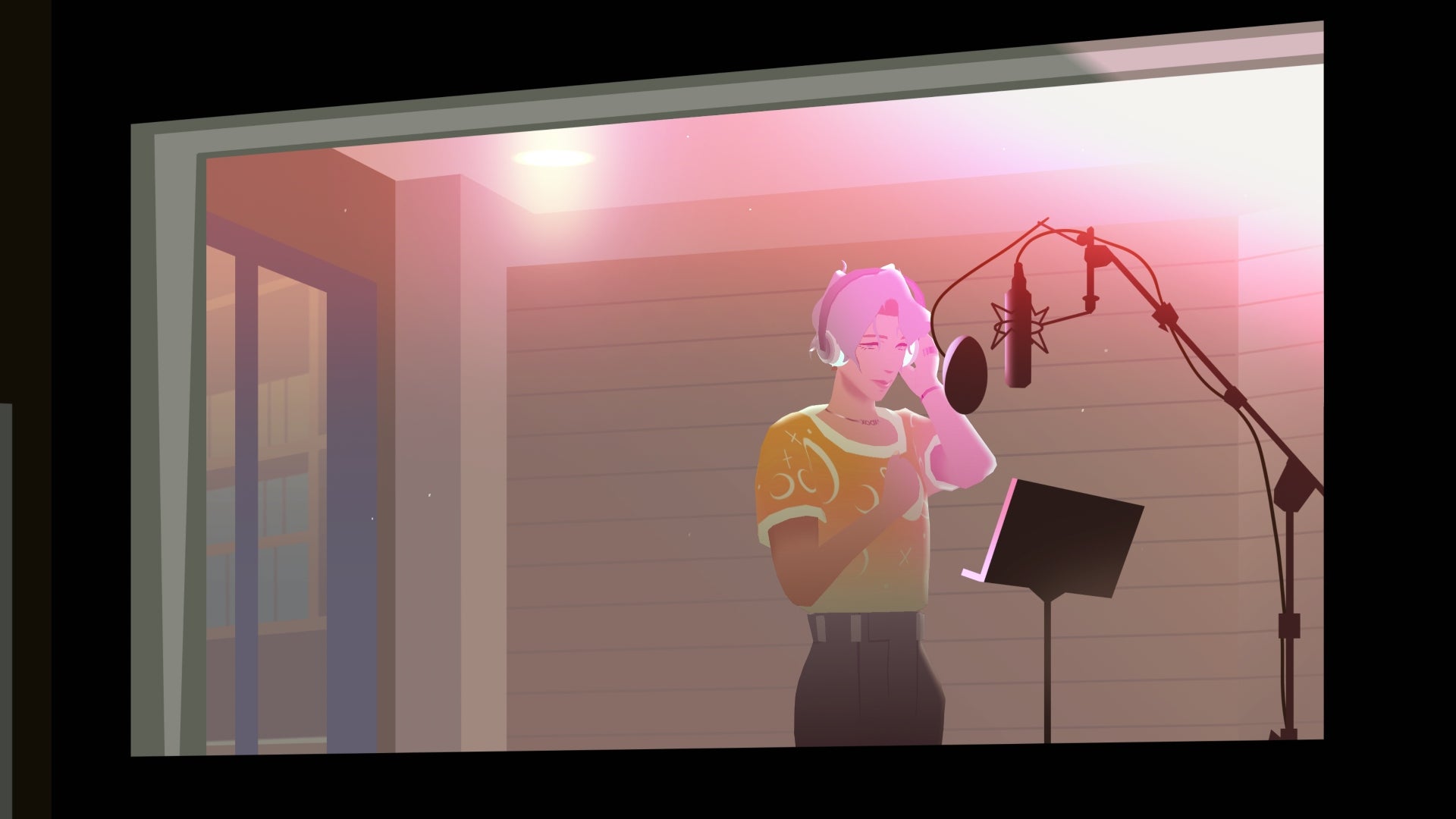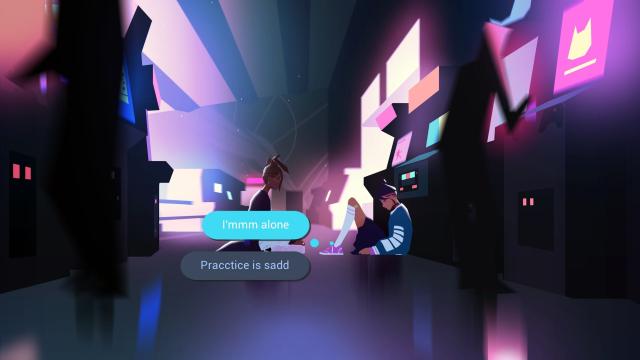We Are OFK is a coming-of-age story about queer friends struggling to make it in L.A.’s brutal music scene that’s part interactive music video, but fully intense. Billed as an extended play (EP) album launch featuring some synthy bops, this narrative adventure gripped me by the heart with its gut-wrenching themes about the creative process and its striking pastel visuals. Honestly, yall, We Are OFK left me in a teary-eyed daze after the first two episodes — and there are three more releasing on a weekly basis, with the third dropping on August 25. It’s an emotional and heavy ride, so I suggest you keep those tissues nearby.
The game follows four “super gay” homies — Carter Flores (they/them), Itsumi Saito (she/her), Jey Zhang (she/her), and Luca Le Fae (he/him) — who all have a love of music but are too scared to commit to the craft. Instead, they laze around Los Angeles, falling in and outta love, bouncing between jobs, texting, drinking in place of practicing. The usual disaffected youth shit when, in all honesty, maybe you’re just afraid of failing. Eventually, some raw and convincing events blow up everyone’s lives and bring them into the studio to work on the EP they were avoiding. When Luca, an aspiring singer-songwriter who used to work in games writing character lore, texted upcoming studio producer Jey that he’d been dodging her because he feared he wasn’t good enough and people wouldn’t understand his expression, I felt that in my bones. I have the same fear.
Part of the reason why the story, and that exchange between Jey and Luca in particular, was so affecting was because We Are OFK has a choice-based dialogue system. You jump between characters pretty often throughout the game, choosing things for Carter to talk about in one moment and selecting texts for Itsumi to send in the next. While each character, who eventually come to form the titular band OFK, has their own distinct personality, you get to imbue a bit of yourself into these people. That’s also a slippery slope because sometimes, as was the case with We Are OFK for me, the game can reflect back something you either might not have wanted to hear or thought you buried deep within long ago. So there were plenty of instances when, as I thought I was being true to the character, I was actually revealing layers of myself. I was lured into introspection regarding my own imposter syndrome through gameplay.
There are a few places, such as the interactive music videos that wrap up each episode, where you control one of the characters, running around completing arbitrary tasks like saving cats and popping balls. The lowkey gameplay works exceptionally well here because it leaves room for the characters and storytelling to fully inhabit the world you interact with. By only asking you to engage in meaningful interactions over giving you the fantasy of constant control, you get to soak in both the engrossing visuals and infectious songs.
Thematically connected to the preceding episode, the music here is just as sumptuous as the visuals. They don’t just make up the game’s soundtrack; they also set the stage for the topics of love and loneliness, failure and friendship, to shine brightly. It’s expansive and transportative, a driving force that underscores the story. You’ll sometimes even hear song lyrics in the dialogue between characters. Truly, everything in We Are OFK is a sensory delight, one that captives on first looks and hooks you in throughout its runtime.
From the summery hues to the soft backgrounds, every panel and screenshot of this game is a feast for the eyes. Sure, the character models are largely low-poly, which doesn’t give them the full capabilities of emoting with the face. But that lack of facial expressiveness is made up through body language and vocal tone. These characters act and feel like real people you might encounter in L.A. or real friends you could actually have in your circle. They’re believable, flawed individuals that send sentence fragments as texts and obsess over the shininess of a crush’s hair, all of which is a testament to the game’s candid writing.
[review heading=”We Are OFK” image=”https://www.kotaku.com.au/wp-content/uploads/sites/3/2022/08/18/19543131425d1db74827d5d9633b7abe.jpg” label1=”BACK OF THE BOX QUOTE” description1=””Oh wow, when did the game’s story make me cry?”” label2=”LIKED” description2=”The thematic connection between music, gameplay, and narrative.” label3=”DEVELOPER” description3=”Team OFK” label4=”RELEASE DATE” description4=”August 18, 2022″ label5=”TYPE OF GAME” description5=”Cinematic Narrative Adventure Game” label6=”DISLIKED” description6=”In some instances, the text is too damn small!” label7=”PLATFORMS” description7=”Nintendo Switch (played), PC, PS4, and PS5″ label8=”PLAYED” description8=”All five episodes, totaling to roughly eight hours of gameplay.” ]
Each character has something — mostly self-inflicted — blocking them from pursuing music as their main career. For one, it’s the side job that’s always in the way. For another, it’s the lack of motivation to finish what was started. In all instances, though, the refusal to chase their dreams stems from the crushing fear of failure, the thought that everything you do will amount to nothing and there will be no success in your chosen path. It’s a debilitating feeling explored with aplomb here. I mean, the band’s struggles both creatively and personally mirror the struggles of every artist.
After all, creating is hard. Finishing and sharing that creation with the world is even harder, and We Are OFK gets that. The game clues you into the process of assembling not just music, but art in general. It illustrates the difficulty of putting your whole self into something for all to judge. In demonstrating what it takes to make a thing, the game burrowed its way into my heart, pulling out my own fears around my choice of creative expression — writing — for me to closely examine. And much like the characters toward the game’s final episode, I realised that what I need — what creatives need — more than just confidence is a support system that reinforces positive self beliefs. The creative process can be very isolating, but We Are OFK shows it doesn’t have to be, that we can create with those who accept us for who we are and trust that we’ll be OK in the end.

Because that’s the real message at the game’s conclusion. Life blows up sometimes, especially if you’re trying to make a living as a creative. Art is extremely volatile under capitalism. But through support systems that uplift us, whether that’s pushing us to do better or joining our indie pop band, we come to find out that we are o-fucking-kay

Leave a Reply